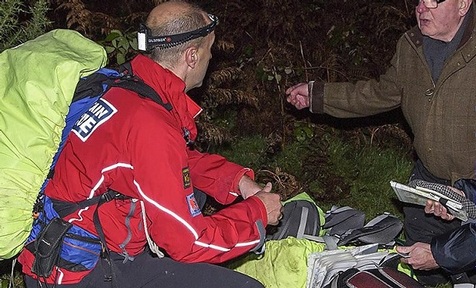English demand GPS like Scotland to give those with dementia 'freedom to roam'
Campaigners are demanding GPS for those with dementia in England to give them the ‘freedom to roam’ just like the Scottish.

People with dementia in Scotland last year gained the right to use a GPS-based tracking device which helps their families, carers and rescue services know where they are.
Now, campaigners in Devon want to see the widespread adoption of GPS devices in England to give those with dementia the freedom and safety to venture out on their own while reassuring their family and friends.
The campaign in England is backed by Plymouth University, Plymouth City Council and the Plymouth Dementia Action Alliance.
A GPS device has been developed in collaboration with potential users, their families, carers, health professionals and the emergency services.
It has been trialled on Dartmoor by members of the Dartmoor search and rescue team and Ian Sherriff, the academic partnership lead for dementia at Plymouth University and chair of the Prime Minister’s Rural dementia-friendly task and finish group.
He said: “Bringing this sort of GPS technology to England for the benefit of people with dementia and especially in rural areas is a true partnership effort.
“It is vital to emphasise that this is not about tracking people with dementia, or using the technology to impinge on their rights as individuals.
"On the contrary, this is all about facilitating greater freedom for them so that they can live their lives to the full in safety and with confidence – while reassuring those close to them and those responsible for locating them if there is a problem.”
Adopted in Scotland in August last year, the GPS tracking device has been described as transforming lives by giving those who were too scared to go out on their own, the confidence to do so.
Ann Pascoe lives in the Highlands with her husband Andrew, who is a photographer and has dementia.
She said: “Andrew’s dementia was inhibiting his ability to pursue his hobby and every time he went out I was worried sick.
"Now that we have this GPS device we are both more confident when he is out and about and the effect for me has been profound – my blood pressure has dropped to the point where I no longer need to take medication.
“I hope that we can see the way clear to allow this GPS system to be adopted in England so that other people can see the benefit too.”
Sussex Police has already bought GPS tracking devices to trace those with dementia in order to save the force time and money trying to find missing people.
Latest News
 29-Jul-24
Dementia Bus gives carehome.co.uk staff insight into life with dementia
29-Jul-24
Dementia Bus gives carehome.co.uk staff insight into life with dementia
 27-Jul-23
UK's top home care agencies in 2023 revealed
27-Jul-23
UK's top home care agencies in 2023 revealed
 30-Nov-22
A quarter of older people keep their falls secret from family
30-Nov-22
A quarter of older people keep their falls secret from family
 29-Nov-22
'Covid-19 has not gone away' say terminally ill
29-Nov-22
'Covid-19 has not gone away' say terminally ill
 28-Nov-22
IT consultant who received poor care opens 'compassionate' home care business
28-Nov-22
IT consultant who received poor care opens 'compassionate' home care business